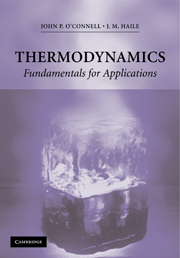0 - Introduction
Published online by Cambridge University Press: 05 June 2012
Summary
You are a member of a group assigned to experimentally determine the behavior of certain mixtures that are to be used in a new process. Your first task is to make a 1000-ml mixture that is roughly equimolar in isopropanol and water; then you will determine the exact composition to within ±0.002 mole fraction. Your equipment consists of a 1000-ml volumetric flask, assorted pipettes and graduated cylinders, a thermometer, a barometer, a library, and a brain. You measure 300 ml of water and stir it into 700 ml of alcohol—Oops!—the meniscus falls below the 1000-ml line. Must have been careless. You repeat the procedure: same result. Something doesn't seem right.
At the daily meeting it quickly becomes clear that other members of the group are also perplexed. For example, Leia reports that she's getting peculiar results with the isopropanol-methyl(ethyl)ketone mixtures: her volumes are greater than the sum of the pure component volumes. Meanwhile, Luke has been measuring the freezing points of water in ethylene glycol and he claims that the freezing point of the 50% mixture is well below the freezing points of both pure water and pure glycol. Then Han interrupts to say that 50:50 mixtures of benzene and hexafluorobenzene freeze at temperatures higher than either pure component.
- Type
- Chapter
- Information
- ThermodynamicsFundamentals for Applications, pp. 1 - 8Publisher: Cambridge University PressPrint publication year: 2005



